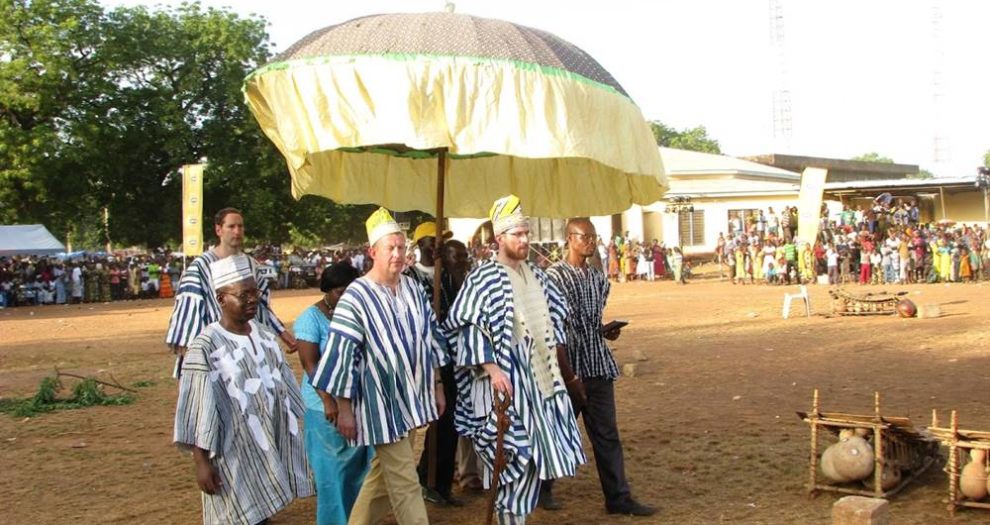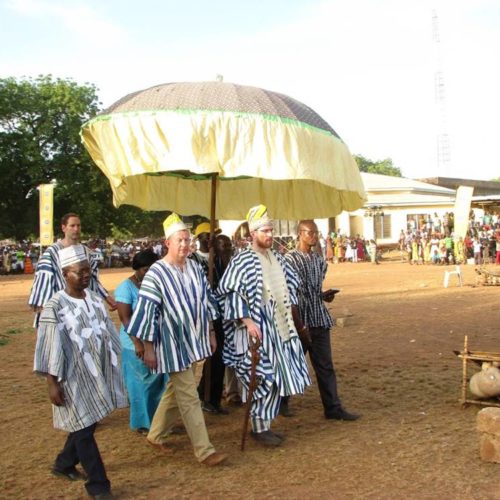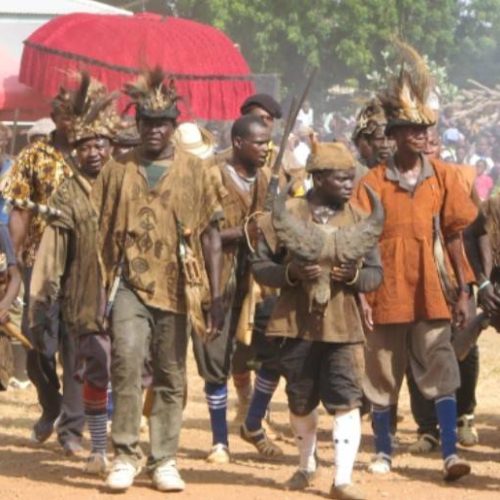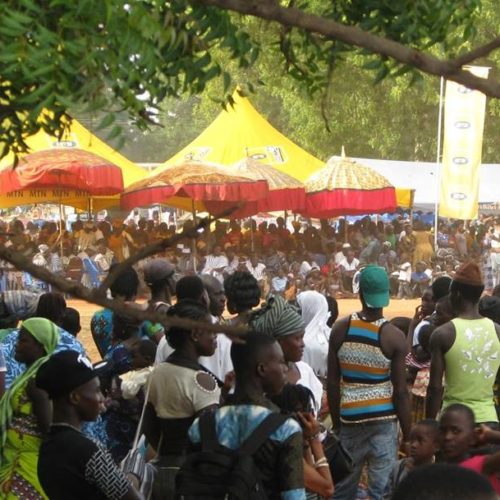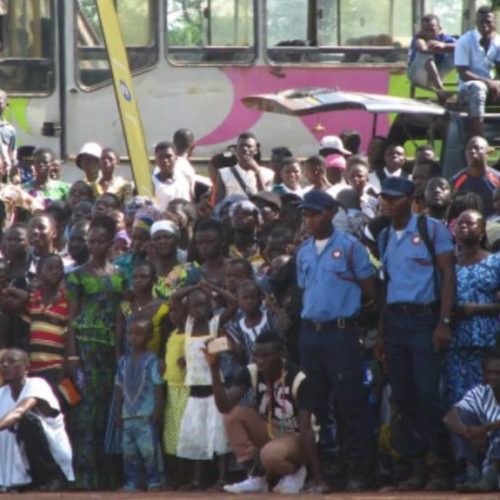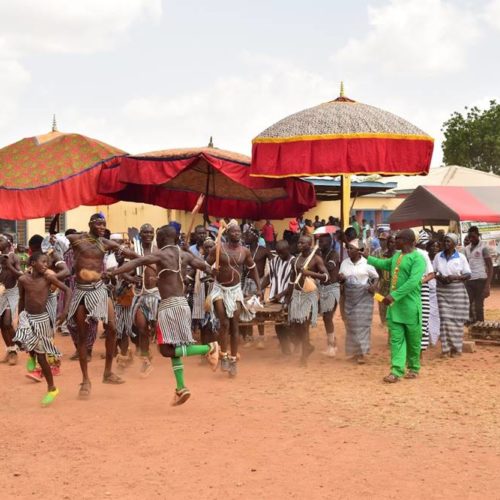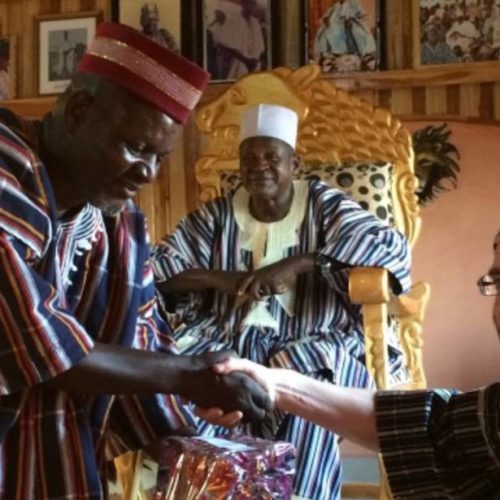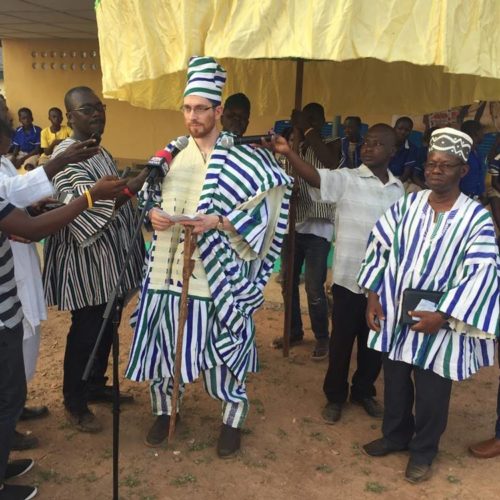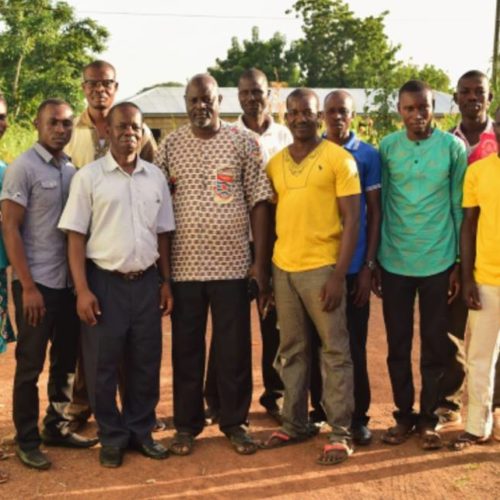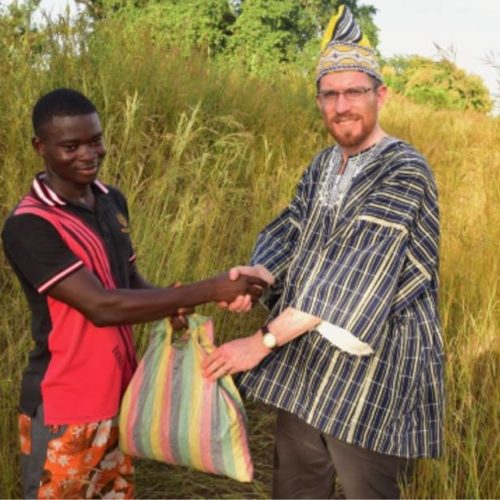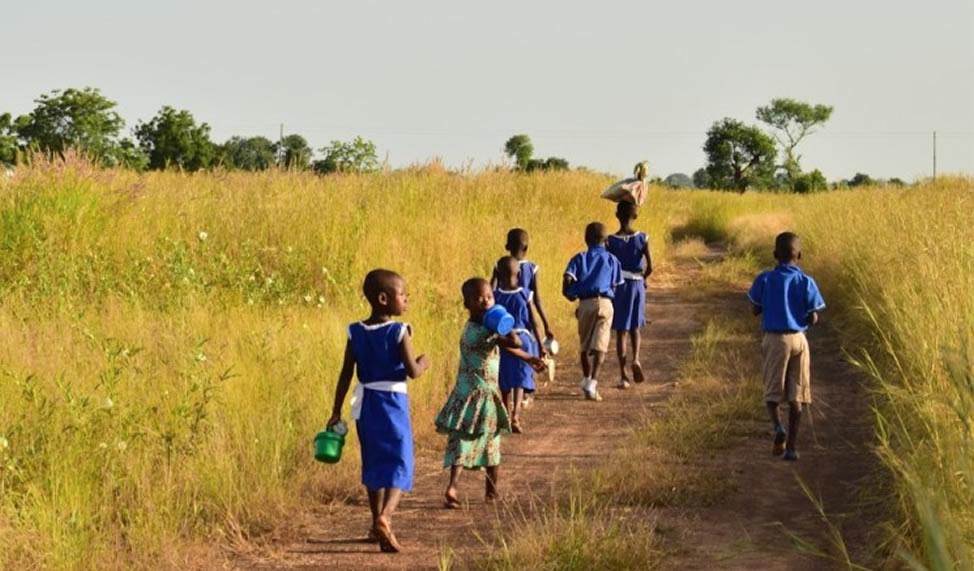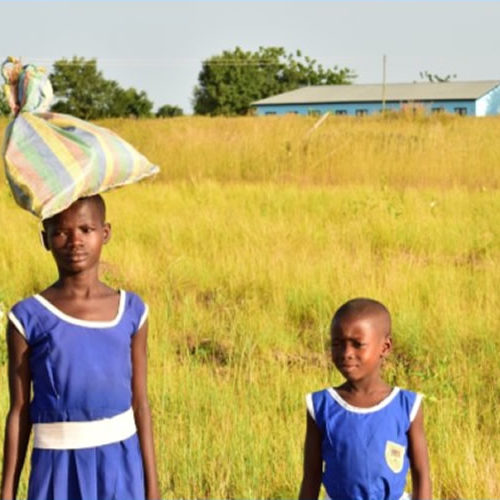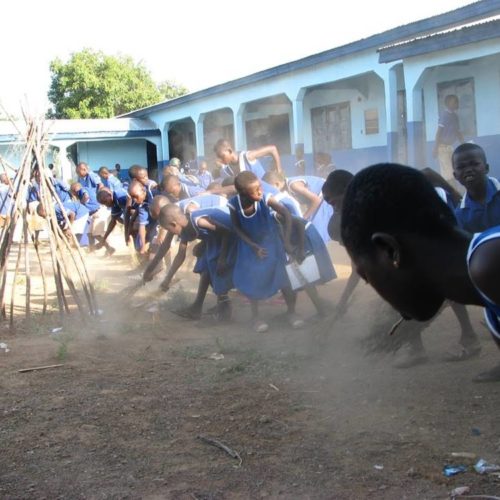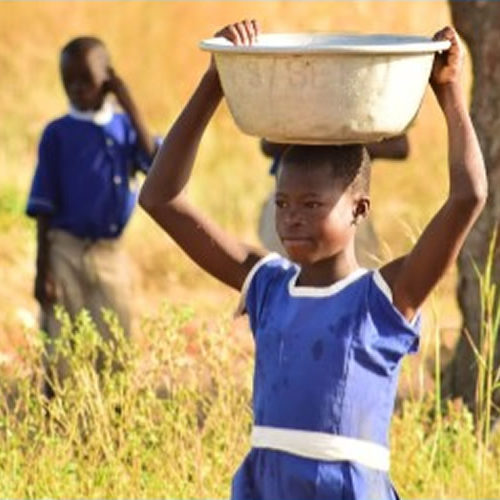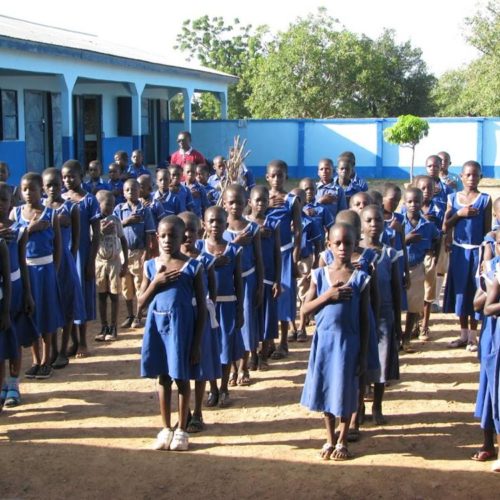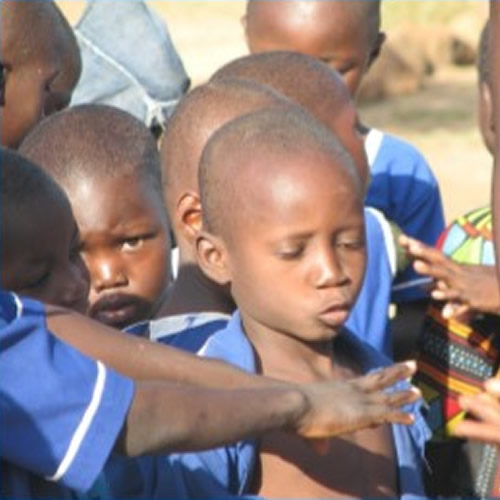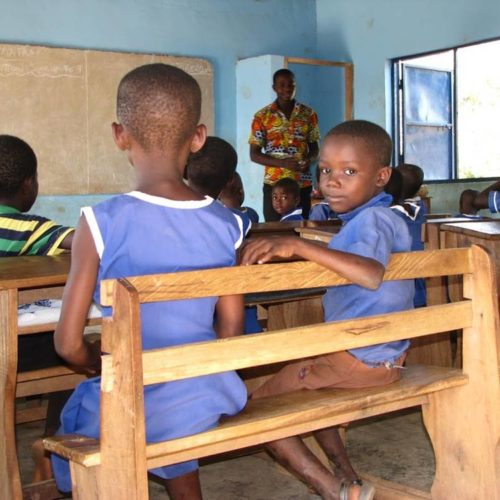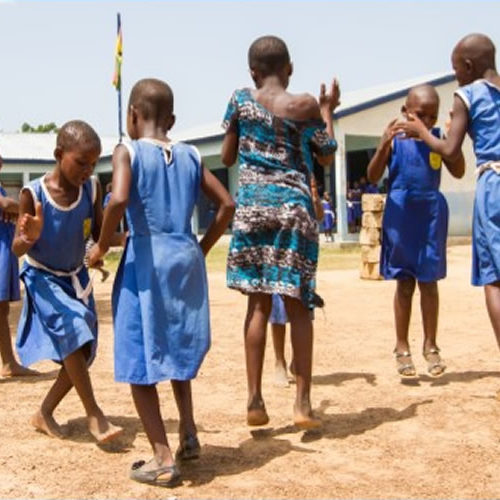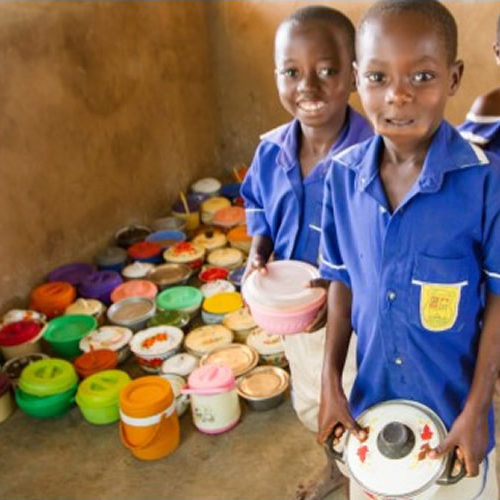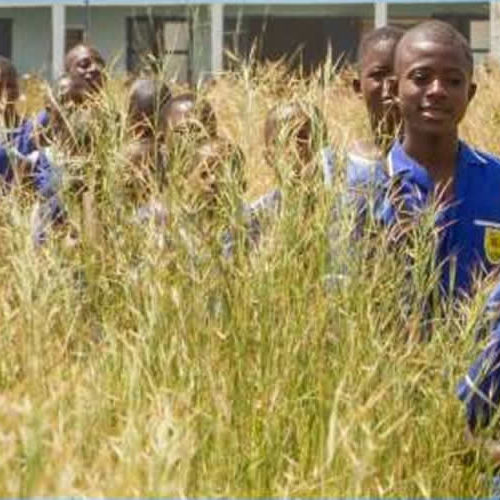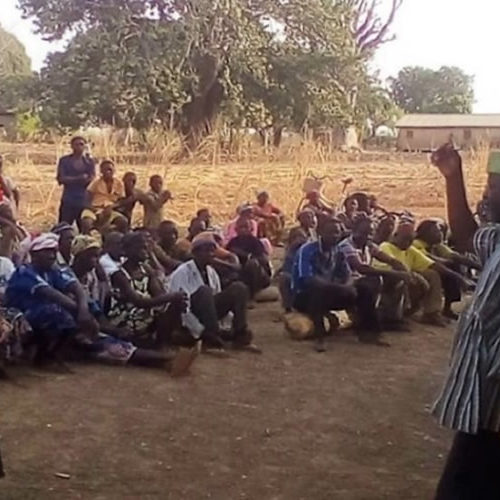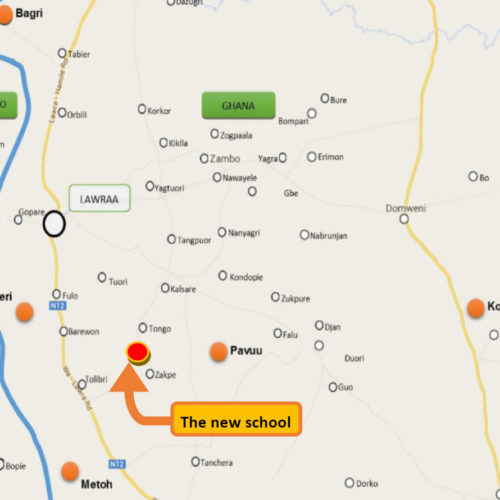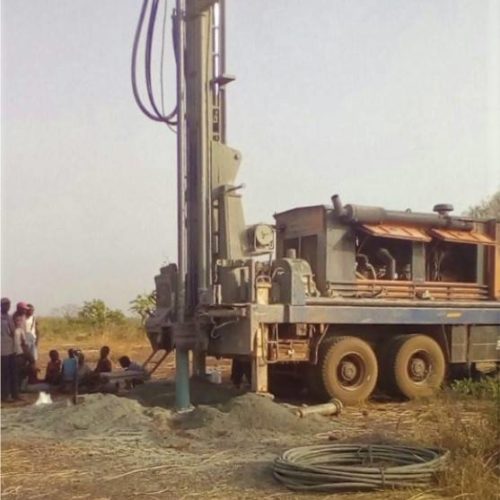Welcome to the online version of our Spring 2017 Newsletter. In this newsletter:
- A Memorable Visit: Maalu Naa
- A Visit to a School
- Quality of Education
- Expansion: A School for Tungan and Zagkpee
- Consolidation: Building Work at our Existing Schools
- Nuhu
- Marching Competition
- Legacies
- Savannah Talks
- Non-Uniform Day
- Thank You
A Memorable Visit: Maalu Naa
We have been privileged to have had many remarkable experiences in Ghana over the years, but none more so than during our visit in October last year. Our intention was to introduce our two new trustees to the work, but we were subsequently invited to visit by the Paramount Chief of the area in order to receive the very rare honour of one of us being appointed (or ‘enstooled’ to use the Ghanaian language) as Maalu Naa, or Development Chief of the Lawra Traditional Area. The purpose of this honour was to publicly recognise the work of the Trust and the impact it has had on the whole area, and as such it served as a dramatic introduction for the new trustees. We were grateful, as with previous visits, to have the costs of the visit kindly donated. The visit provided an important opportunity to have meetings with staff, teachers, district education officers and local communities during an exciting, busy week.
The start of the week had been taken out of our hands: the enstoolment at the annual festival of Kobine – a time when the whole region comes together at the end of the harvest. This was an extraordinary experience accompanied by processions, by much dancing and music, and the firing of muskets. It was moving to see students from our schools taking part in the ceremony in their bright blue uniforms. They spoke of how they had been affected by the schools, and that without them they would still be illiterate. Having arrived in Ghana only a short time before, it felt emotional and (particularly for the new trustees) slightly shocking to be sat in front of a crowd of thousands.
Through the ceremony we felt a tremendous spirit of warmth towards not just the newly enstooled Maalu Naa (Howard) but towards each of us – and indeed towards all associated with Savannah Education Trust. It is incredibly humbling to think that this people – so far removed from us in distance and culture – have now welcomed us as one of their own. The tremendous appreciation of the work of the charity was the key theme from the celebrations.
The position demonstrates full acceptance of the charity by the community, and comes with a considerable amount of respect and even reverence (indeed to an extent that sometimes seems strange to our Western eyes). It was clear that the work of the Trust is greatly appreciated. This was reflected in the warm words of the dignitaries at the event, and by the subsequent private reception hosted by the District Commissioner (the head of the regional government) at his private and palatial residence on the edge of Lawra. The officials, particularly from the Ghana Education Service, emphasised how much they appreciated the local leadership of Pastor Charles Karbo and the close working relationships that he has fostered. But they also noted that, unlike many Western organisations working in Ghana, Savannah has never sought praise or publicity – and has persevered with the work in this remote area for over a decade. Their comments went well beyond the usual pleasantries, and indeed our subsequent meetings with local government during the week had a noticeably more enthusiastic tone than any of our previous meetings.
The Maalu Naa – where possible – takes part in the leadership of the area. To recognise these privileges and responsibilities, elaborate clothing was worn for the occasion: a richly embroidered gown and trousers, a tall hat (signifying the wearing of the burdens and joys of the people) and a carved stick (representing the removal of obstacles).
Later in the visit, as we drove down dusty tracks, and stopped to view the ancient mud houses we were amused to hear little children running into the distance shouting ‘the Maalu Naa is coming!’ We are thankful that the impact of Savannah has been felt and seen not just by the dignitaries but particularly by the poorest in the isolated communities across this area. As we met some villagers harvesting their crops, it was touching to be presented with a bag of freshly dug peanuts as a token of their appreciation.
The Paramount Chief made a generous speech about the work of Savannah in front of the assembled crowds. For those of us working in the UK, the work can sometimes be hard – and the needs immense and almost overwhelming. In the intense heat, the crowd seemed to listen more intently as the Paramount Chief (the leader of this whole area of some 50,000 souls) spoke passionately of the impact of the Trust. “The Traditional Council is very appreciative of these interventions in the development of our children, and we confidently state that the programmes of the Trust in Lawra are the most significant interventions to have happened in this area in the last decade. The Trust’s unique approach of delivering their projects relies on the local people and is a model worthy of emulation by all charity organisations. The impact of the Trust on the education sector and in the lives of the children and communities in which it operates is immense. It cannot be overemphasised.”
During his acceptance speech, Howard pointed out that the Savannah Education Trust has always been a partnership. This includes the local villagers who help build the schools, the local education officials who provide the teachers and monitor their effectiveness, the Savannah team on the ground who bring everything together, and especially our kind and loyal supporters in the UK and elsewhere.
We stand amazed and acknowledge the goodness of God over more than a decade of the charity’s work. The Paramount Chief’s words about the impact of the Trust’s work in the lives of the people was witnessed in countless conversations and events during our week in this area – from the children who have achieved excellent exam results, to those who can now read the Word of God for themselves. The villages themselves seemed transformed places from the poverty-stricken communities that we first visited over a decade ago. And we were also glad to witness the wonderful commitment of our loyal team in Ghana – expanded in size but freshly motivated and committed to continue the work and, as funds allow, to bring hope to yet more villages.
“Not unto us, O Lord, not unto us, but unto thy name give glory, for thy mercy, and for thy truth’s sake” (Psalm 115).
A Visit to a School
The Maalu Naa ceremony was unique. The visits to each of our Savannah schools were not so unusual but were equally memorable. We often wish that we could take our supporters to experience the thrill of seeing the schools in action. The best time to visit is soon after sunrise. As you drive along dusty tracks, the early morning sun casts a soft but vivid light. Out of the twilight, the blue sky, deep green grass and mud-red road seem to come to life. Suddenly, another bright blue is added. Children in their blue uniforms – some tiny, some older – are winding their way along the tracks and through waving grass towards the distant, blue school buildings. One of our new trustees commented that, while he had seen the photos, been to talks and read newsletters, nothing could quite prepare him for the first sight of the Savannah children on their way to school. It truly is a beautiful sight.
Even though it is early, when you arrive at the school it is already alive. There are chores to be done: firewood to collect for cooking, the courtyard and classrooms to be swept and plants to be watered. The early morning air is full of the chatter of children, as they continue to arrive from all points of the compass – clutching an empty pot (for lunch) or some books.
At 7.30 the children assemble outside in the courtyard between the primary school and nursery buildings. A rigorous inspection follows, with particular attention paid to cleanliness of hands and fingernails and the state of uniforms. The headteacher makes some remarks and announcements and we, as visitors, are asked to say a few words. A teacher then leads the children in prayer, the singing of the Ghanaian national anthem and the national pledge:
I promise on my honour to be faithful and loyal to Ghana my motherland. I pledge myself to the service of Ghana with all my strength and with all my heart. I promise to hold in high esteem our heritage, won to us through the blood and toil of our fathers; and I pledge myself in all things to uphold and defend the good name of Ghana. So help me God.
There then follows a highly dramatic start to the school day. Suddenly three drums start beating, quietly at first and then more loudly. Class by class, the children march into their classrooms, with arms and legs swinging in time to the beat.
Our schools each have around 400 pupils (when full), split across eleven classrooms. We were impressed by the quality of teaching that we witnessed. The teachers are well motivated, the children are lively and engaged and – compared with any other schools in the region – the school has many more resources at its disposal.
The new trustees, visiting for the first time, were particularly impressed by the professionalism of the teachers and the efficient running of the schools. They were struck by how happy, healthy and well-nourished the children at our schools looked. But they saw, just a few miles beyond the schools, the distressing signs of hunger and poverty in children who are not attending school. It is a clear demonstration of the huge difference these Christian schools are making in the region.
One evening, back at the office in Lawra, we received a surprise visit from three local chiefs. The schools are transforming their local communities. They had not managed to speak to us amid thronging Kobine crowds at the enstoolment. Wanting to express their appreciation, they came bearing gifts – including guinea fowl. The chief of Bagri movingly described how the school had turned his village “from upside down, to being able to stand up, and finally to be able to see the sky.”
One of the new trustees commented that, “I genuinely had not expected there to be so much local gratitude towards the Trust – but it was lovely, and humbling, to see.”
Quality of Education
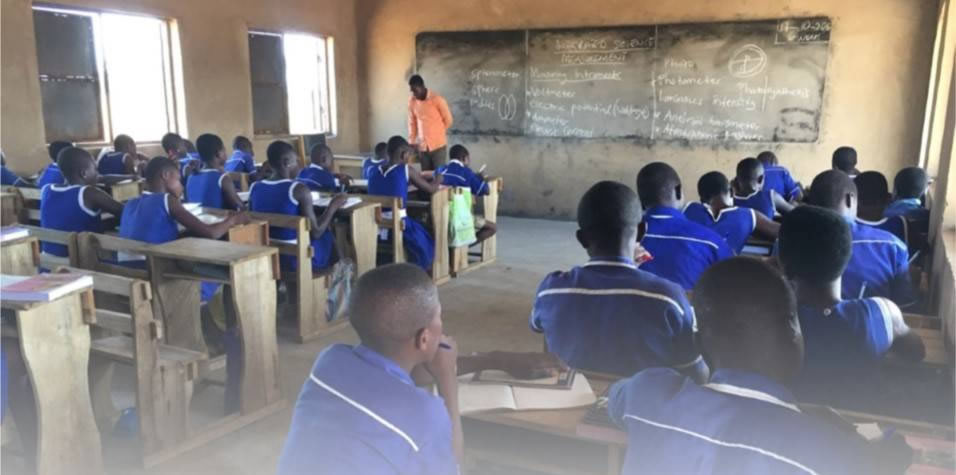
One of the joys of visiting our schools is to see the children learning. We note in the article above that we have been struck by the professionalism of the schools, and we are often asked questions such as ‘what are the lessons like in the Savannah Schools?’ or ‘what is the quality of education like in Ghana?’
We have always answered that the measure of a quality education in the remote villages where we are working starts from a low baseline: first, having a school building (which we address through the building programme); secondly, having a qualified teacher at the front of each class (hence our teacher scholarship programme); and, thirdly, having a class full of pupils – rather than them working on farms or looking after siblings – (which we encourage through the feeding programme). Of course, many villages across rural Africa (even if they have a school in name) do not have these basic essentials of a quality education.
A tour of any of the Savannah schools is a positive, heart-warming experience – not just beautiful, blue buildings but dynamic, vibrant environments alive with excited children who are keen to learn. As the soft warm hues of early morning give way to the harsher monochromes of mid-day, pupils at the Savannah schools are immersed in their lessons. A hubbub of excited chatter can be heard from one corner of the courtyard; from another classroom drifts the sound of chanting as a young class recite the English alphabet; from another class, girls and boys run outside to gather stones to use as counters for their numeracy lesson. We are thankful that the Savannah schools are now fully staffed with motivated and qualified teachers – a result of the Teacher Scholarship Programme, the dedication of our team in Ghana and the ongoing support of the Ghana Education Service. There are now over 60 teachers across the five sites, with the Junior High Schools requiring more than one teacher per class as the curriculum is organised by subject. Teaching is less interactive than in a typical school in the UK, but with large class sizes – in a culture where adults are respected and pupils are keen to learn – this approach works well. A Christian ethos permeates all that is done and the classes read from the Bible and suitable Christian literature.
A visit to the school office reveals the aspirational mindset and strong leadership of the Savannah schools – which, perhaps, challenges the stereotype of schools in rural Africa. On the notice board is a handwritten statement of the school’s mission and values. Beneath this is a long list of key performance indicators (including pupil attendance rate, teacher attendance rate, pupil performance data and textbook ratios) alongside the associated targets for improvement during the current academic cycle. End of term examination results for each pupil are displayed and this information is used to track progress for each pupil from term to term and between years. Progress against these measures of school improvement are monitored by a Circuit Supervisor appointed by the Ghana Education Service – and, in turn, Pastor Charles Karbo and his team ensure that the Supervisors visit regularly.
The approach to individual teacher appraisal is equally thorough. Each term the headteacher observes a lesson from each teacher rating 74 criteria (subdivided into personal qualities, attitude to work, preparation for teaching, lesson presentation and class management, work output, relationships and social traits) between 1 (never) and 5 (very often). A teacher regularly scoring low marks on this appraisal could have their pay docked. A teacher frequently excelling and scoring high marks on their appraisal would be recommended for the ‘Best Teacher in the District Award’ – an award which has previously been sponsored by Savannah – which raises the profile of the profession and acts as a motivation for teachers working in some rather difficult conditions.
As the number of Savannah schools has increased, with a combined school roll of approximately 1,300 pupils, we have been pleased to see the growing level of collaboration between schools. The headteachers meet frequently in the office in Lawra to work collectively on schemes of work and assessment matters. The Ghana Education Service is keeping an interested eye on attempts to standardise tests, examination papers and marking across the schools.
It is with great thankfulness that we observed these things during our recent visit. For the teachers this makes a real difference: instead of labouring on their own in a remote school, they have the Savannah team and a network of Savannah teachers supporting them to provide the quality education that the children need.
Expansion: A School for Tungan and Zagkpee
The countryside in the area in which Savannah Education Trust works is beautiful: a classic savannah landscape, barren in the dry season but alive with green grass and fruitful trees during the time of the rains. As you leave the Trust’s small office in the market town of Lawra and head south, you travel along bumpy tracks through this attractive scenery to two adjoining villages – the villages of Tungan and Zagkpee.
As we often comment when showing photographs of this area, the glory of the landscape is deceptive. If you lingered a little longer at these villages, you would soon find shocking incidences of desperate poverty: subsistence farmers struggling to make ends meet and malnourished children. And you would search in vain for a school. Neither of these two villages has ever enjoyed the benefits of an education.
Between the two villages is a small hill: a vantage point that allows views across the local area, but also an ideal location for a school. After prayerful consideration, it has been agreed to start work on a new school in Tungan-Zagkpee. This will be the sixth village within which the charity is working.
In January the first meetings were held with the local communities, who are very excited. As with all of the Savannah schools, the involvement of the community is crucial. Without them a school cannot function successfully. The villagers have committed to supporting the school, including helping with the construction.
As supporters will remember, the key to a sustainable school is the ongoing support from the Ghana Education Service. By February 2017, we received a message confirming their willingness once again to support the ongoing teaching costs of another Savannah school. We are thankful that they are willing partners, and do not attempt to alter the ethos of our schools.
Since then things have moved quickly. The borehole was drilled in March. This is always the first activity on a new school site. It provides the immediate benefit of clean water to the local communities but also a plentiful supply of water for the building work. During April a building committee was established and the site cleared ready for construction. Then the moulding of blocks began. Since May the foundations have been laid and the walls are now rising. It is possible that the work will be advanced enough for the first classes to start for the new academic year in September. We are thankful that the Savannah building team led by the foreman, Solomon, has now become highly skilled at these type of building projects.
Consolidation: Building Work at our Existing Schools
Across our existing five schools, life is as busy as ever for pupils and teachers. There are now about 1,300 pupils across our five sites: each receiving a Christian education and a meal each day.
The major refurbishment work at Bagri has now been completed.
At Gberi the new Junior High School (for pupils aged 11 to 14) is finished, and the final touches of paint were added in March. Ever since the school was opened, the marshy ground on the approach to the school has caused difficulties for pupils and teachers alike in the rainy season. An access road has now been constructed, which will have huge benefits for all those travelling to the school. This type of significant construction work is only possible because of the tipper truck, which supporters will remember was a major item of expenditure in 2014.
At Pavuu the new Junior High School is also complete. This is similar to Gberi – a one block building for older pupils. Unlike Gberi, however, this is not a new build, but the renovation of an existing building (the nursery block). A small bridge has been constructed near the school which will aid access during the rainy season.
Nuhu
Supporters may recall a little girl called Nuhu, who attends our first school at Bagri. When she was featured in our short DVD (2011), she was only 7. But already she was walking a long distance to school. Her willingness to walk so far, across savannah grassland and through stifling heat or torrential rain, was an active demonstration of how much the school is valued in this community. It is sobering to think that, before Savannah started work in this village, nearly one in four children like Nuhu died before their 5th birthday.
Nuhu is now 12 and enjoying her first year at the Junior High School in the village – having moved on from the primary school. At the end of her time at the primary school, she received a copy (alongside all of her classmates) of the Bible and also the book, Bible Doctrines. These have kindly been donated by a congregation in the UK.
In her own words, “Before the blue school was built, I was dirty and I never had enough to eat. I like school – now I am learning to read and write with my friends. When I finish at school, I want to be a nurse.”
Some further examples of the children who attend our schools, including photos and video, are available here.
Marching Competition
To celebrate Ghana’s Independence Day (in March), the whole area comes together for a keenly contested marching competition for schools. This year, the Savannah school at Gberi were the overall winners. Pavuu came a close second.
Legacies
We have been touched and moved to receive a number of legacies from people who have remembered us in their will. One in particular has allowed us to proceed with the new school at Tungan-Zagkpee. We want to acknowledge our thankfulness to the Lord for this provision of funding.
Savannah Talks
We would like to arrange a number of talks over the Autumn and Winter to provide an update on the work; if you would like us to speak in your area, we would be very happy to hear from you.
Non-Uniform Day
For those involved with schools (teachers, governors or even parents), we have some flyers about a non-uniform day for pupils in the UK in support of Savannah Education Trust. If you would like to discuss this, or indeed other ways that schools in the UK can support the work in Ghana, please contact us.
Thank you
We remain very grateful to all of our supporters for their loyal and ongoing support, which becomes ever more important as the work continues to expand.

